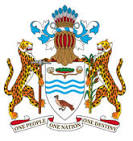Originally a Dutch colony in the 17th century, by 1815 Guyana had become a British possession. The abolition of slavery led to settlement of urban areas by former slaves and the importation of indentured servants from India to work the sugar plantations. The resulting ethnocultural divide has persisted and has led to turbulent politics. Guyana achieved independence from the UK in 1966, and since then it has been ruled mostly by socialist-oriented governments. In 1992, Cheddi JAGAN was elected president in what is considered the country's first free and fair election since independence. After his death five years later, his wife, Janet JAGAN, became president but resigned in 1999 due to poor health. Her successor, Bharrat JAGDEO, was reelected in 2001 and again in 2006. Early elections held in May 2015 resulted in the replacement of President Donald RAMOTAR by David GRANGER.
Guyana is a parliamentary republic.
Members:
Resources
Displaying 11 - 15 of 34Amerindian Act (Cap. 29:01).
This Act provides for local government of Amerindians, i.e. an Indian who is a member of a tribe indigenous to Guyana. For this purpose Amerindian Districts, Amerindian Areas and Amerindian Villages are established.The Act also provides for the protection of property of Amerindians and establishes the Amerindian Purposes Fund. The Minister may establish District Councils or Area Councils as a body corporate. The Councils shall, among other things, manage and regulate the use and occupation of land situated in a District, Area or Village.
Land Registry (Validation of Awards) Act (Cap. 5:06).
This Act validates awards of title of the Commissioner of Title in respect of lands of a specified area of Barbados. The titles shall be deemed to be valid and effectual in law as though the awards were made in compliance with provisions of the Land Registry Act.
Landlord and Tenant Act (Cap. 61:01).
This Act provides the legal framework for the relationship between landlords and tenants. It consists of 63 sections and is divided into 9 Parts: Preliminary (sects. 12-2); Nature of tenancies and the law applicable thereto (sects. 3-4); Capacity for letting and taking on hire land and buildings (sect. 5); Provisions relating to leases (sects. 6-12); Provisions relating to tenancies generally (sects. 13-19); Recovery of rent by distress (sects. 20-35); Special provisions relating to the landlord’s right of distress for rent (sects. 36-43); Landlord’s duty to repair certain tenements (sect.
Immovable Property (Sale of Interests) Act (Cap. 60:01).
This Act provides for remedies in the case of disputes involving sale of an immovable common property that is undivided in shares. Any owner may request the Court to direct the sale of the property and the distribution of proceeds thereof. The Court shall have also discretion to direct a sale where sale is not requested by an owner of a moiety or upwards in accordance with section 4 (sect. 5). The Court may allow parties interested in the property to bid at the sale. Parties are allowed a partition suit. Section 8 regulates the relationship between this Act and other law. (10 sections)
Registration of Landlords Act (61:02).
The Chairman of the Central Housing and Planning Authority shall keep a register of all persons defined by this Act as landlords, i.e. any person who under any tenancy is entitled to rents and profits of land or buildings. Every landlord shall register as a landlord within two months of the commencement of the tenancy. Applications for registration shall be made in the form set out in the Schedule. The State shall be exempted from registration as a landlord. Other provisions of this Act deal with transfer of registration or amendments in the register.


